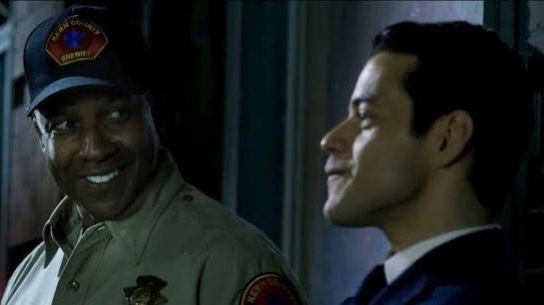“The Little Things,” a crime film written and directed by John Lee Hancock, premiered on Jan. 29 on HBO Max, where it will be available to stream until Feb. 28. Hancock wrote the script in the early 1990s; however, the film was not completed until 30 years later, which explains why it feels dated and stuck in a different decade. Nonetheless, the film takes place in the ’90s and reflects the decade it was written in. Similarly to Netflix’s true crime docu-series, “Night Stalker: The Hunt for a Serial Killer,” “The Little Things” follows a pair of detectives searching for a serial killer in Los Angeles. This serves not to draw attention away from “The Little Things” but rather place the audience in an understandable situation while making room for an intriguing, altered variation. The film skillfully creates several captivating juxtapositions between its characters and scenes.
Deputy Sheriff Joe “Deke” Deacon (Denzel Washington) is a former detective who helps with the investigation because it reminds him of an older murder case he was unable to solve. Washington steps into the role as if it were made for him; his performance is prepared without coming off as overly rehearsed. Even during scenes when he is simply sitting in a hotel room, facing a wall or examining evidence, it is made apparent to the audience he is in deep thought. It is obvious from the way Washington plays this character that there is a storied past, and he is able to deliver on the trauma that detectives undoubtedly face after years of working on murder cases.
Deacon enters the investigation with a more patient, methodical practice than those around him, demonstrating he has seen everything there is to see. However, despite his experience, it becomes clear how this case and its connection to older ones affects his mental ability to handle the job. There are times when his intense thought is disrupted by confused mutterings, which Washington uses to convince audiences how heavy the job can weigh on a person.

Detective Jim Baxter (Rami Malek) is paired with Deacon on the case. Malek purposely exudes a similar but younger energy as his older scene partner. Like Washington, Malek is able to show exactly what his character is thinking through his facial expressions and brings a more determined and active role to the investigation, plainly hoping he will be able to get through the case without breaking down.
The parallels between Deacon and Baxter are brilliantly executed, and while they are not exactly subtle, they leave viewers pondering the comparison. Both characters are detectives working on a seemingly impossible case, starting out with a happy family and stable lives. However, audiences feel the fear Deacon experiences when he looks at Baxter and worries he will lose it all like he did. The characters’ close relationship feels earned not only because of the time they spend together but also because the audience sees the kindred spirit they find in each other.
Albert Sparma (Jared Leto) is a strange self-proclaimed true-crime enthusiast who Deacon and Baxter suspect is the murderer. Although Leto tends to overact around the acclaimed Washington, he adds an ambiguity to his character that keeps audiences guessing whether he is the serial killer. His offbeat dialogue noticeably stands out in an otherwise straightforward and concise narrative. This is expressed not only in the lines themselves but also in the cartoonish manner Leto delivers them.

The rest of the movie comes off as more comprehensive. The murders, for instance, are explained tactfully, and they do not distract viewers from what Hancock really aims to show: Deke and Baxter’s relationship. Both come in danger of losing everything; however, Washington is able to guide Malek, so his work does not haunt him. More than once the audience is reminded of the common rookie-veteran relationship, and another crime movie that comes to mind is “Seven,” where the older detective teaches the ropes to his younger partner. However, unlike “Seven,” “The Little Things” is less affected and more realistic towards its subject in a refreshingly new yet classic story.
Unfortunately, while men make up the main ensemble, the film’s actresses are severely underrepresented. Aside from the token female Detective Jamie Estrada (Natalie Morales) and coroner Flo Dunigan (Michael Hyatt), the women in the movie are no more than shadows. This is especially unusual since women are so integral to the plot, with the murder victims being mainly comprised of women. Understanding more about these characters would not only add urgency but also depth to the case.
Overall, Hancock provides viewers with an unaffected film that makes them think not only about morality but also the question of assured justice. “The Little Things” reminds viewers of the clichéd themes of time and history repeating itself; however, it provokes a more interesting interpretation of those themes. The ending twists and turns in ways the viewer cannot help but feel shocked about. This film should be watched until the very end because the reveal in the last scene takes the audience’s breath away.
Lucia Arreola is an Entertainment Staff Writer. She can be reached at arreoll1@uci.edu.





